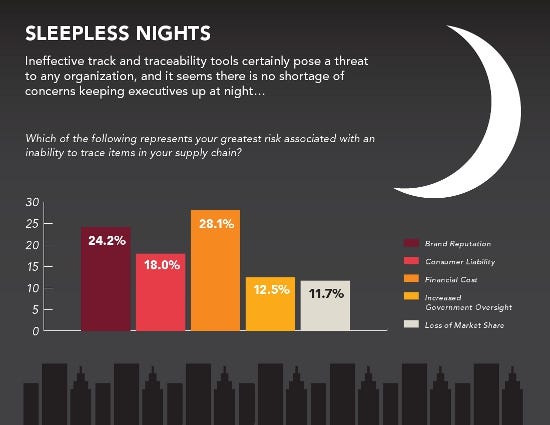Track-and-trace concern high, confidence low for efficient product recalls
March 11, 2015
A new study released by RedPrairie Corp. found that almost 72 percent of senior supply chain and operations executives are not completely confident in their organizations' product recall and traceability abilities. The full report, entitled "On the Trail to Traceability" can be downloaded at www.commerceinmotion.com/feature/on-the-trail-to-traceability.
As part of its research into Commerce in Motion, RedPrairie commissioned Gateway Research to survey supply chain and operations executives from 130 consumer product goods, life sciences, and food and beverage companies to identify their confidence and capabilities in effectively tracking, tracing and recalling products up and down their global supply chains.
Additional findings include:
•More than half of executives are concerned about their ability to isolate items with their own supply chain.
•Coordinating recall issues with suppliers and distributors is a real concern for almost 70 percent of executives surveyed.
•Only 51 percent of organizations are able to execute a product recall within hours.
•Less than 20 percent have deployed traceability technology solutions to help fully-automated trace and recall processes.
•Forty-six percent say their companies are struggling to stay compliant with regulations.
•Almost one-third of executives were most concerned that their ineffective ability to trace items would have a negative financial impact on their company. Almost 25 percent of them also cited negative brand reputation as a pressing concern.

On the Trail to Traceability study
•Eighty-six percent are worried about their financial liability if something goes wrong with a product recall process.
"Costing on average $10 million1, product recalls are understandably any company's worst nightmare," says Simon Ellis, practice director, Supply Chain Strategies for IDC Manufacturing Insights. "New legislation adds increasing complexity to the challenge of successfully executing traceability programs. Technology solutions that help to isolate products, proactively issue alerts and handle inventory reconciliation will be key to avoiding the negative outcomes of a poorly executed recall."
"Despite all the challenges and concerns associated with product recalls, what surprised us most in this research was that almost 30 percent of executives claimed to be very confident in their ability to trace items across their supply networks," says Dave Bruno, RedPrairie marketing director. "Given the low-levels of technology adoption to help automate the processes and facilitate collaboration across suppliers and distributors, this confidence could potentially be misplaced."
A recent videocast of RedPrairie experts analyzing and discussing the report's findings with analyst Simon Ellis of IDC can be accessed here: http://bit.ly/JJwKD5
1 "Recall Executing Effectiveness: Collaborative Approaching to Improving Consumer Safety and Confidence" conducted by Deloitte on behalf of the Food Marketing Institute (FMI), the Grocery Manufacturers Associate (GMA) and GS1 U.S., May 2010
Source: RedPrairie
.
About the Author(s)
You May Also Like


